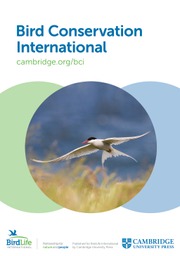Crossref Citations
This article has been cited by the following publications. This list is generated based on data provided by
Crossref.
ROJAS-SOTO, OCTAVIO R.
NAVARRO-SIGÜENZA, ADOLFO G.
and
ESPINOSA DE LOS MONTEROS, ALEJANDRO
2010.
Systematics and bird conservation policies: the importance of species limits.
Bird Conservation International,
Vol. 20,
Issue. 2,
p.
176.
Esselstyn, Jacob A.
Oliveros, Carl H.
Moyle, Robert G.
Peterson, A. Townsend
McGuire, Jimmy A.
and
Brown, Rafe M.
2010.
Integrating phylogenetic and taxonomic evidence illuminates complex biogeographic patterns along Huxley’s modification of Wallace’s Line.
Journal of Biogeography,
Vol. 37,
Issue. 11,
p.
2054.
Oliveros, Carl H.
and
Moyle, Robert G.
2010.
Origin and diversification of Philippine bulbuls.
Molecular Phylogenetics and Evolution,
Vol. 54,
Issue. 3,
p.
822.
Lohman, David J.
Ingram, Krista K.
Prawiradilaga, Dewi M.
Winker, Kevin
Sheldon, Frederick H.
Moyle, Robert G.
Ng, Peter K.L.
Ong, Perry S.
Wang, Luan Keng
Braile, Thomas M.
Astuti, Dwi
and
Meier, Rudolf
2010.
Cryptic genetic diversity in “widespread” Southeast Asian bird species suggests that Philippine avian endemism is gravely underestimated.
Biological Conservation,
Vol. 143,
Issue. 8,
p.
1885.
Haig, Susan M.
Bronaugh, Whitcomb M.
Crowhurst, Rachel S.
D'Elia, Jesse
Eagles-Smith, Collin A.
Epps, Clinton W.
Knaus, Brian
Miller, Mark P.
Moses, Michael L.
Oyler-McCance, Sara
Robinson, W. Douglas
and
Sidlauskas, Brian
2011.
Genetic Applications in Avian Conservation.
The Auk,
Vol. 128,
Issue. 2,
p.
205.
Sánchez-González, Luis A.
and
Moyle, Robert G.
2011.
Molecular systematics and species limits in the Philippine fantails (Aves: Rhipidura).
Molecular Phylogenetics and Evolution,
Vol. 61,
Issue. 2,
p.
290.
ONG, PERRY S.
LUCZON, ADRIAN U.
QUILANG, JONAS P.
SUMAYA, ANNA MAE T.
IBAÑEZ, JAYSON C.
SALVADOR, DENNIS J.
and
FONTANILLA, IAN KENDRICH C.
2011.
DNA barcodes of Philippine accipitrids.
Molecular Ecology Resources,
Vol. 11,
Issue. 2,
p.
245.
Miranda, Hector C.
Brooks, Daniel M.
and
Kennedy, Robert S.
2011.
Phylogeny and Taxonomic Review of Philippine Lowland Scops Owls (Strigiformes): Parallel Diversification of Highland and Lowland Clades.
The Wilson Journal of Ornithology,
Vol. 123,
Issue. 3,
p.
441.
Schweizer, Manuel
Güntert, Marcel
and
Hertwig, Stefan T.
2012.
Phylogeny and biogeography of the parrot genusPrioniturus(Aves: Psittaciformes).
Journal of Zoological Systematics and Evolutionary Research,
Vol. 50,
Issue. 2,
p.
145.
Jones, Owen R.
Purvis, Andy
and
Quicke, Donald L. J.
2012.
Latitudinal gradients in taxonomic overdescription rate affect macroecological inferences using species list data.
Ecography,
Vol. 35,
Issue. 4,
p.
333.
Brown, Rafe M.
Siler, Cameron D.
Oliveros, Carl H.
Esselstyn, Jacob A.
Diesmos, Arvin C.
Hosner, Peter A.
Linkem, Charles W.
Barley, Anthony J.
Oaks, Jamie R.
Sanguila, Marites B.
Welton, Luke J.
Blackburn, David C.
Moyle, Robert G.
Townsend Peterson, A.
and
Alcala, Angel C.
2013.
Evolutionary Processes of Diversification in a Model Island Archipelago.
Annual Review of Ecology, Evolution, and Systematics,
Vol. 44,
Issue. 1,
p.
411.
Katzner, Todd E.
and
Collar, Nigel J.
2013.
Are Insular Populations of the Philippine Falconet (Microhierax erythrogenys) Steps in a Cline?.
The Condor,
Vol. 115,
Issue. 3,
p.
576.
Hosner, Peter A.
Nyári, Árpád S.
Moyle, Robert G.
and
Triantis, Kostas
2013.
Water barriers and intra‐island isolation contribute to diversification in the insular Aethopyga sunbirds (Aves: Nectariniidae).
Journal of Biogeography,
Vol. 40,
Issue. 6,
p.
1094.
Hosner, Peter A.
Boggess, Nikki C.
Alviola, Phillip
Sánchez-González, Luis A.
Oliveros, Carl H.
Urriza, Rolly
and
Moyle, Robert G.
2013.
Phylogeography of theRobsoniusGround-Warblers (Passeriformes: Locustellidae) Reveals an Undescribed Species from Northeastern Luzon, Philippines.
The Condor,
Vol. 115,
Issue. 3,
p.
630.
Gill, Frank B.
2014.
Species taxonomy of birds: Which null hypothesis?.
The Auk,
Vol. 131,
Issue. 2,
p.
150.
Lim, Haw Chuan
Chua, Vivien L.
Benham, Phred M.
Oliveros, Carl H.
Rahman, Mustafa Abdul
Moyle, Robert G.
and
Sheldon, Frederick H.
2014.
Divergence history of the Rufous-tailed Tailorbird (Orthotomus sericeus) of Sundaland: Implications for the biogeography of Palawan and the taxonomy of island species in general.
The Auk,
Vol. 131,
Issue. 4,
p.
629.
Cotterill, Fenton P. D.
Taylor, Peter J.
Gippoliti, Spartaco
Bishop, Jacqueline M.
and
Groves, Colin P.
2014.
Why One Century of Phenetics is Enough: Response to “Are There Really Twice As Many Bovid Species As We Thought?”.
Systematic Biology,
Vol. 63,
Issue. 5,
p.
819.
Hosner, Peter A.
Sánchez-González, Luis A.
Peterson, A. Townsend
and
Moyle, Robert G.
2014.
CLIMATE-DRIVEN DIVERSIFICATION AND PLEISTOCENE REFUGIA IN PHILIPPINE BIRDS: EVIDENCE FROM PHYLOGEOGRAPHIC STRUCTURE AND PALEOENVIRONMENTAL NICHE MODELING.
Evolution,
Vol. 68,
Issue. 9,
p.
2658.
Brooks, T. M.
Cuttelod, A.
Faith, D. P.
Garcia-Moreno, J.
Langhammer, P.
and
Pérez-Espona, S.
2015.
Why and how might genetic and phylogenetic diversity be reflected in the identification of key biodiversity areas?.
Philosophical Transactions of the Royal Society B: Biological Sciences,
Vol. 370,
Issue. 1662,
p.
20140019.
Sánchez-González, Luis Antonio
Hosner, Peter A.
Moyle, Robert G.
and
Maldonado, Jesus E.
2015.
Genetic Differentiation in Insular Lowland Rainforests: Insights from Historical Demographic Patterns in Philippine Birds.
PLOS ONE,
Vol. 10,
Issue. 8,
p.
e0134284.


